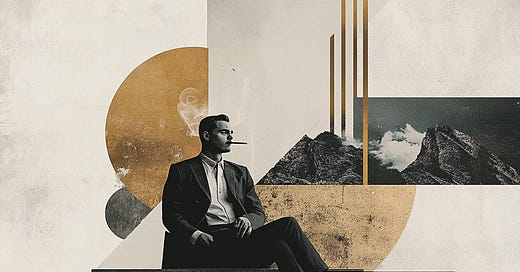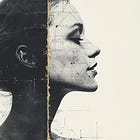The Moment AI Surpasses You—and What Comes After
Recalibrating your worldview and learning to thrive when machines master what you do
Welcome to Unknown Arts, where builders navigate AI's new possibilities. Ready to explore uncharted territory? Join the journey!
In 2016, Lee Sedol faced a moment every knowledge worker will eventually encounter.
One of the greatest Go players in history, Sedol sat across from an AI system called AlphaGo created by Google's Deepmind AI team. Over five matches, he didn't just lose to the machine—he felt it challenge everything he understood about a game he'd mastered over decades. It turned the craft to which he'd dedicated his life upside down, making moves that were simultaneously brilliant and alien to human intuition.
"Losing to A.I., in a sense, meant my entire world was collapsing," Sedol later told The New York Times. The experience so profoundly affected him that he eventually stepped away from professional Go entirely. "I could no longer enjoy the game," he explained, "So I retired."
When machines surpass humans, they break our understanding of reality
What Sedol experienced goes beyond simple defeat. Researchers call it "ontological shock"—the psychological impact of encountering something that fundamentally challenges your understanding of the world.
This isn't just grappling with a tool becoming more efficient—it's something that forces us to question what we thought was uniquely human. When AI demonstrates capabilities that match or exceed human skill and mastery, it challenges our basic assumptions about our intelligence, creativity, and identity.
These transformative moments are accelerating
Industry leaders suggest we're approaching a watershed moment. Anthropic's CEO Dario Amodei predicts "AI systems will be better than humans at almost everything" within two to three years. OpenAI's CPO Kevin Weil thinks it could happen even sooner.
What Sedol experienced in Go last decade is now echoing across other domains of human mastery as more experts face their own moments of ontological shock.
Just last week, Paul Schrader, the legendary screenwriter behind "Taxi Driver," shared his own encounter with this reality. "I've just come to realize AI is smarter than I am," he posted. "Has better ideas, has more efficient ways to execute them. This is an existential moment, akin to what Kasparov felt in 1997 when he realized Deep Blue was going to beat him at chess."
What triggered this revelation? "I asked it for Paul Schrader script ideas," he explained. "Had better ones than mine." The shock deepened when he tested it further: "I just sent ChatGPT a script I'd written some years ago and asked for improvements. In five seconds it responded with notes as good or better than I've ever received from a film executive."
I’ve never worked in the film industry (despite living in Los Angeles), but Paul’s experience resonates with what I’ve felt personally and what I’ve noticed in the community. Despite working in our little, industry silos, every creative person faces this existential threat. We are all in this together.
I've already faced my own versions of this reckoning
Writing, research, programming, design, music… AI has substantial advantages over me in every creative discipline I practice.
My own ontological shock hit home after feeding my writing archive (which is now hundreds of articles and hundreds of thousands of words) into Claude. With that context and a few prompts to guide the way, Claude can often write a good draft of an article in my style in just a few seconds. It makes me question the ongoing value of doing the work myself while also strengthening my belief that my unique POV is the only differentiator that matters. Putting words to paper is faster and cheaper than ever, but replicating how I see the world due to the life I’ve lived is hard.
For the time being, I still have strengths it can’t match (namely my creative vision, my lived human experience, and the drive to create) but I have little doubt it will learn to replicate aspects of these in due time. The tech is already good enough to trigger these feelings and the rate of its improvement is only increasing.
You can't outrun this reality, but you can mentally prepare for it
As Noam Brown, a researcher at OpenAI, notes: "It can be hard to 'feel the AGI' until you see an AI surpass top humans in a domain you care deeply about."
But the truth is, this moment of ontological shock—when AI surpasses you in something you've mastered—is coming for everyone who creates. The only choice is how to meet it.
Some, like Lee Sedol, will step away entirely. Others will adapt, finding new ways to create value alongside AI capabilities. The key isn't trying to compete where AI excels, but understanding how your human experience and judgment factor into a new world order where AI executes the majority of creative work.
Your creative identity must be bigger than any single skill
What makes these moments so powerful is that they force us to confront fundamental questions about who we are as creators. It's not just about skills becoming obsolete—it's about the psychological weight of watching machines master what we thought made us special.
When we define ourselves primarily by our mastery of specific crafts—writing, design, programming—we become vulnerable to displacement by AI. Instead, we need to recognize that our value lies in something more fundamental: our ability to understand human experience, to identify what matters, and to guide creative work toward meaningful impact.
When Lee Sedol said he "could no longer enjoy the game," he was telling us something profound: once you've seen AI master your craft, you can't unsee it. The joy of discovery, the thrill of finding novel solutions, the deep satisfaction of mastery—these experiences change when you know a machine can find better moves in milliseconds. Your relationship with the work itself transforms.
The ontological shock of AI surpassing human ability is coming. The question isn't whether we'll face the moment, but how we'll choose to define ourselves when we do.
Until next time,
Patrick
Interested in working together? Check out my portfolio.
Find this valuable?
Share it with a friend or follow me for more insights on X, Bluesky & LinkedIn .









I think the ontological shock will come when AI displays authentic initiative.